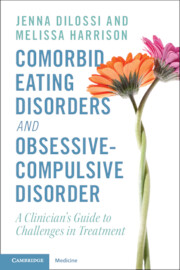 Comorbid Eating Disorders and Obsessive-Compulsive Disorder
Comorbid Eating Disorders and Obsessive-Compulsive Disorder from Part I - Overview of the Existing Literature
Published online by Cambridge University Press: 14 December 2023
Eating disorders (EDs) can be treated with inpatient, residential, partial hospital, and outpatient care through various therapeutic orientations. Studies indicate that evidence-based treatment models in the least restrictive environment lead to the best outcomes. One treatment option is FBT for adolescent EDs, which encourages families to externalize the illness and be a primary agent of change. Cognitive-behavioral therapy (CBT) for EDs is collaborative and requires patient motivation. It includes forms like CBT-E, CBT-guided self-help, 10-session cognitive-behavioral therapy, and CBT for ARFID which are structured and manualized. CBT-E targets body weight, shape, and control and maintenance variables of the illness. Interpersonal psychotherapy (IPT) is a structured, time-limited treatment for adults with BN and BED, focusing on how relationships affect ED symptoms. Both IPT and CBT are effective for binge-related behaviors and cognitions. CBT-AR is a treatment option for individuals over 10 years old with all presentations of ARFID who are medically stable and not dependent on tube feeding.
To save this book to your Kindle, first ensure [email protected] is added to your Approved Personal Document E-mail List under your Personal Document Settings on the Manage Your Content and Devices page of your Amazon account. Then enter the ‘name’ part of your Kindle email address below. Find out more about saving to your Kindle.
Note you can select to save to either the @free.kindle.com or @kindle.com variations. ‘@free.kindle.com’ emails are free but can only be saved to your device when it is connected to wi-fi. ‘@kindle.com’ emails can be delivered even when you are not connected to wi-fi, but note that service fees apply.
Find out more about the Kindle Personal Document Service.
To save content items to your account, please confirm that you agree to abide by our usage policies. If this is the first time you use this feature, you will be asked to authorise Cambridge Core to connect with your account. Find out more about saving content to Dropbox.
To save content items to your account, please confirm that you agree to abide by our usage policies. If this is the first time you use this feature, you will be asked to authorise Cambridge Core to connect with your account. Find out more about saving content to Google Drive.